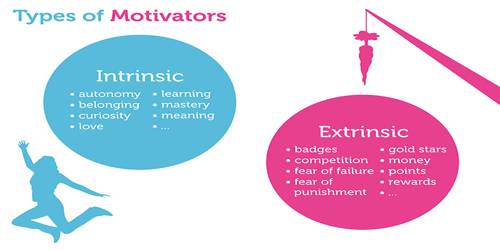Motivation is the reason for people’s actions, desires, and needs. Motivation is one of the essential aspects of HRM which is concerned with the process of inducing, inspiring, organizing, and stimulating employees to do the better job in the organization. The term is generally used for humans but, theoretically, it can also be used to describe the causes of animal behavior as well. Motivation activates people for better job performance and high productivity.
Intrinsic and extrinsic motivation
Intrinsic motivation is when you do something because you enjoy it or find it interesting. Compare that to Dani, whose reason for running involves extrinsic motivation, or doing something for external rewards or to avoid negative consequences. Intrinsic motivation refers to motivation that is driven by an interest or enjoyment in the task itself, and exists within the individual rather than relying on any external pressure. Intrinsic motivation has been studied by social and educational psychologists since the early 1970s. Research has found that it is usually associated with high educational achievement and enjoyment by students. Explanations of intrinsic motivation have been given in the context of Fritz Heider’s attribution theory, Bandura’s work on self-efficacy, and Deci and Ryan’s cognitive evaluation theory (see self-determination theory). Students are likely to be intrinsically motivated if they:
- attribute their educational results to internal factors that they can control (e.g. the amount of effort they put in),
- believe they can be effective agents in reaching desired goals (i.e. the results are not determined by luck),
- are interested in mastering a topic, rather than just rote-learning to achieve good grades.

Extrinsic motivation comes from outside of the individual. It refers to behavior that is driven by external rewards such as money, fame, grades, and praise. This type of motivation arises from outside the individual, as opposed to intrinsic motivation, which originates inside of the individual.
Intrinsic motivation is derived from intangible factors. For example, someone who writes music for his own listening pleasure is relying on intrinsic motivation. A person who writes music to sell for profit is using extrinsic motivation.
Common extrinsic motivations are rewards like money and grades, coercion, and the threat of punishment. Competition is in general extrinsic because it encourages the performer to win and beat others, not to enjoy the intrinsic rewards of the activity. A crowd cheering on the individual and trophies are also extrinsic incentives.
Social psychological research has indicated that extrinsic rewards can lead to overjustification and a subsequent reduction in intrinsic motivation. In one study demonstrating this effect, children who expected to be (and were) rewarded with a ribbon and a gold star for drawing pictures spent less time playing with the drawing materials in subsequent observations than children who were assigned to an unexpected reward condition and to children who received no extrinsic reward.
Self-determination theory proposes that extrinsic motivation can be internalized by the individual if the task fits with their values and beliefs and therefore helps to fulfill their basic psychological needs.
Information Source:
















